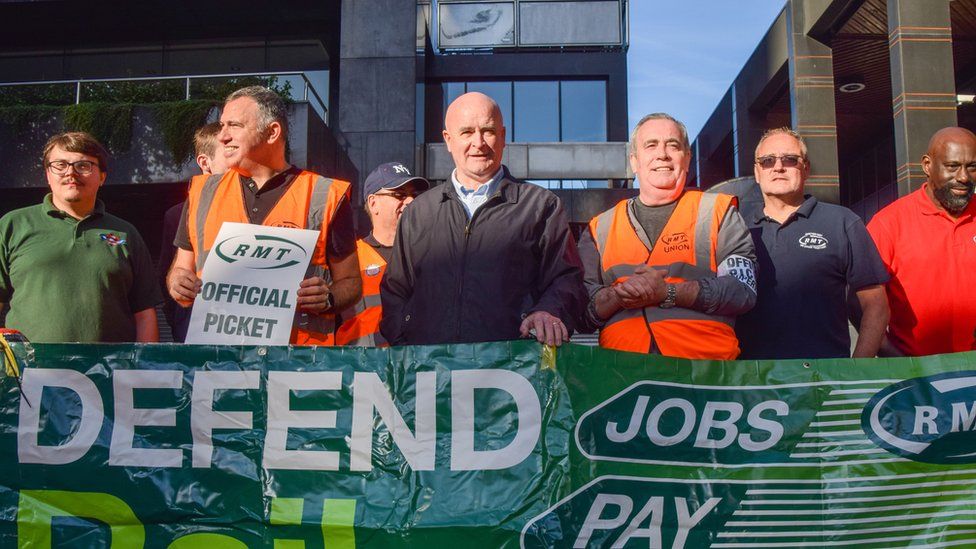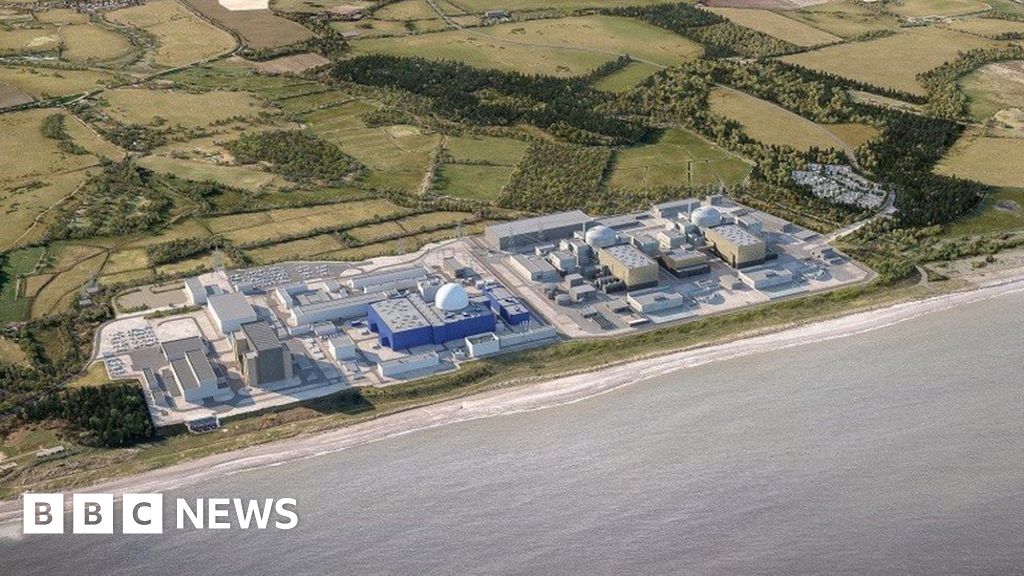ARTICLE AD BOX
 Image source, SOPA Images
Image source, SOPA Images
RMT general secretary Mick Lynch on a picket line during a strike this summer.
By Katy Austin
Transport correspondent
Rail workers in the RMT union are voting on whether to continue strike action for a further six months.
The ballot closes on 15 November and is part of an ongoing dispute over pay, job security and working conditions.
RMT members at 15 train companies and Network Rail have taken part in eight nationwide strike days since June. No more are currently scheduled.
Network Rail is preparing to make a revised offer to unions.
Meanwhile, at the Trades Union Congress later, union leaders are expected to warn that the anger felt by their members over wages not keeping up with inflation could lead to hundreds of thousands going on strike this winter.
In recent months, rail workers, dock workers, and BT and Royal Mail employees have been involved in industrial action. Nurses, doctors and teachers are also being balloted on whether to join the picket line and this week unions are expected to vote in favour of co-ordinating any strike action.
The government has said it will do whatever it can to minimise disruption. But TUC general secretary Frances O'Grady will say that government plans to make it harder to strike are a "cynical effort to distract from the mess'' ministers have caused.
Rail strikes have brought train services across large swathes of Britain to a halt.
The most extensive disruption took place on 1 October, when members of several rail unions including drivers' union Aslef, all took part in strikes on the same day. Only around 1 in 10 of the usual services ran.
The RMT's current six-month 'mandate' ends late next month. If members vote in favour and there is no breakthrough in talks, strikes could continue into Spring 2023.
In a BBC interview on 1 October, RMT general secretary, Mick Lynch, revealed that the decision had already been taken to re-ballot.
However, he insisted the RMT would prefer to reach a settlement to end the dispute.
He told MPs on the Transport Select Committee last week that more money and "a change in attitude and a change of stance" were needed from the government and the rail industry, for a solution to be reached.
There is pressure to cut costs following the impact of the pandemic, when travel patterns changed and the government effectively took control of the railway.
Rail bosses say working practices they regard as outdated need to change, to free up money for pay increases - rather than taxpayers or passengers paying more.
Unions oppose some of these changes. At the committee hearing, Mr Lynch emphasised that negotiations were "all about conditions" not only pay, and unions were still being asked to accept things that they could not.
London Euston station was closed on 1st October, when members of the RMT and Aslef unions were both on strike.
Network Rail, which maintains and operates the rail infrastructure, employs roughly half of the more than 40,000 members involved in the dispute.
The RMT rejected its offer from July, which involved a 4% pay rise this year followed by a 4% pay rise in 2023, plus benefits such as highly discounted travel for employees and their families.
This was partly conditional on changes to the way maintenance teams work, which involve some job losses. Examples including changing the way staff are rostered and using technology for some track inspections instead of sending workers out.
Network Rail now intends to press ahead with those changes even if the RMT disagrees, because it says the financial situation is urgent. However it is understood to be taking into account some ideas the union has proposed.
It has been preparing to make a slightly revised offer in this week's talks.
The pay offer - previously dismissed by the RMT's Mick Lynch as "puny" - is expected to remain the same, but the guarantee of no compulsory redundancies would be extended for one more year until 2025.
Negotiations with representatives of train companies appear to have made little progress.
The Rail Delivery Group, which speaks for them, said the "actions of the RMT leadership [were] driving more people off the rail network".
They added "we had hoped given their recent call for 'intense negotiations' they would give our staff and customers a much-needed break from the disruption and lost pay of the last five months - and continue the constructive atmosphere that is more likely to produce a swift agreement and secure the long-term future of this industry".
The new Transport Secretary Anne-Marie Trevelyan, has taken a different approach to the disputes than her predecessor Grant Shapps.
She has previously told BBC news she wanted to get all sides around the table to find compromises and solutions.
Ms Trevelyan has met not only industry bosses but union leaders - who welcomed the move but said there had so far been no significant change in position.
Among the changes the RMT and TSSA unions oppose are what they have described as mass ticket office closures.
The transport secretary told the Conservative Party conference that she had asked the rail industry to review ticket office provision, but insisted the aim was to serve passengers in the way they needed. For example moving out from behind glass in ticket offices.
The government has promised a new law that will mean transport operators have to provide "minimum service levels" during strikes.
Legislation is expected to enter Parliament later this week.
Aslef, whose members have also held several large-scale strikes, said the proposals would not work.

 2 years ago
57
2 years ago
57








 English (US) ·
English (US) ·